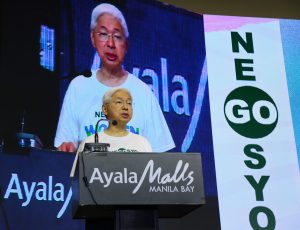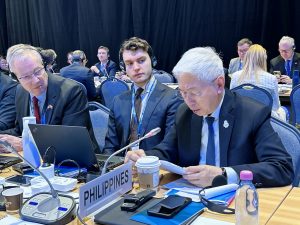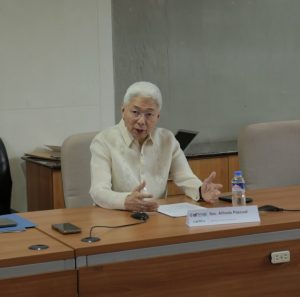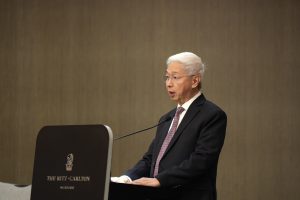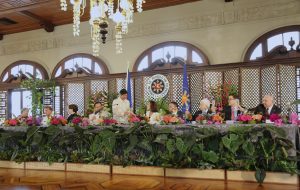18 December 2020 via Zoom
[Acknowledgements]
Distinguished guests, ladies and gentlemen, good afternoon!
We are pleased to see representatives from government and the academe here at the “Makers Without Borders” webinar. Today, we shall witness the launching of three national initiatives enabled by the partnership between the Philippine and the US Governments centering on our Shared Service Facility (SSF) fabrication laboratories (or Fablabs).
First, with the assistance of the United States Agency for International Development (or USAID) through their Science, Technology, Research and Innovation for Development (or STRIDE) program, the FAB LABs Philippines network will be launched virtually. This will be done with the signing of a Memorandum of Understanding (MOU) between the 23-member institutions of the said network.
Second, the Department of Trade and Industry’s Bureau of Small and Medium Enterprises (DTI-BSMED) will be virtually launching the 2021-2023 action plans and targets for all the DTI-funded SSF Fablabs. Third, DTI’s Philippine Trade Training Center (PTTC) will be virtually launching the DigiFab. This is a Makerspace innovation center that will serve as a national training facility for our Micro, Small, and Medium Enterprises (MSMEs).
An integral part of the Maker Movement, Makerspaces are characterized by the collaboration of sharing and building ideas, and is more than just the tools and equipment available within these spaces. Fablabs and Makerspaces are mentioned interchangeably, and both have appeared to converge towards a similar structure and use. Each can be characterized as a community workshop where members share access to tools in order to produce physical goods.
Presently, there are 35 Fablabs in the Philippines housed mostly in academic institutions. At the national level, Fablabs in the country provide our MSMEs assistance in product design and rapid prototyping, digital fabrication, design consultation and assessment services, innovation awareness activities, and research, among others.
For years, our Fablabs have also provided maker services and assisted in maker projects like a 3D hazard map for Bantayan Island in Cebu and a collapsible refugee home scale model, among others. More importantly, our community of makers helped produce locally-fabricated PPEs for Filipino healthcare frontliners during the 2020 global health crisis.
Meanwhile, some of our universities have already partnered with industry to provide support for Makerspaces, given the general agreement that the Maker Movement has a strong potential to positively impact not just university education but also business.
Thus, we envision all our Fablabs to grow as spaces for innovation in the country, while also becoming a major part of the global Maker Network. In order to continually effect positive change in our society, the Philippine Fablabs shall gradually assume a bigger role in the international Makerspace community by becoming a unique place where people converge to make things happen.
This is our vision for an Integrated Makerspace Network: to break technological barriers and give the next generation of Filipinos an opportunity to be part of a technology-driven future through the development of critical 21st century skills.
Moreover, the launch of new FabLabs and Makerspaces in our country can help our people address the challenges of the high costs of prototype creation, which involves time, effort, and money. This is where future industry leaders can transform ideas into tangible products or services that provide relevant solutions to identified problems.
Overall, this will aid us in implementing our Inclusive Innovation Industrial Strategy (or i³S) to grow innovative and globally competitive manufacturing, agriculture, and services. Through this strategy and with the support of the Fablabs and Makerspaces, our Regional Inclusive Innovation Centers (RIICs) across the country will help boost each region’s capacity for innovation. This, in turn, will help them to contribute to the Philippines’ national progress and socioeconomic development.
Our ultimate goal is that with the Fablab and Makerspace projects, our country’s economic growth story will continue in a post-COVID future. Through the transformation of Filipinos ideas into commercially-viable products, our MSMEs will become more innovative and competitive. And as our MSMEs boost our economy’s growth, they will generate more jobs and employment for our people, which would give them a better and more comfortable quality of life.
We are confident that today’s launch of the three national Fablab initiatives will relay a clear message across to the rest of the world that the Philippines—under the leadership of President Rodrigo Roa Duterte—is innovative, dynamic and resilient. Now, more than ever, we are ready to roll up our sleeves and make things happen for our fellow maker-Filipinos.
Let’s MAKE IT HAPPEN IN THE PHILIPPINES!
Thank you and tayong lahat! ♦
Date of Release: 18 December 2020




